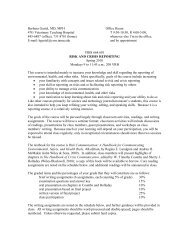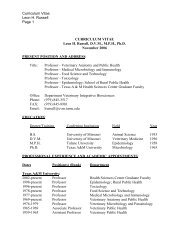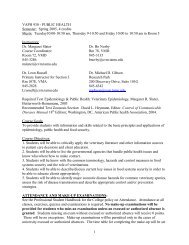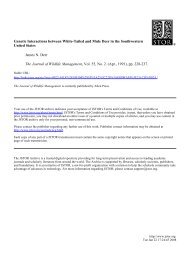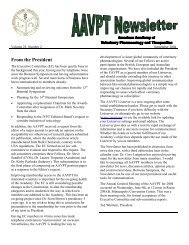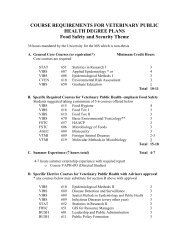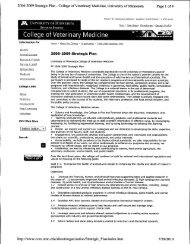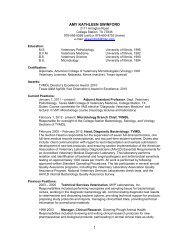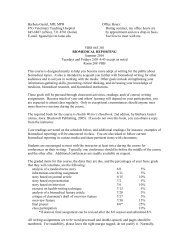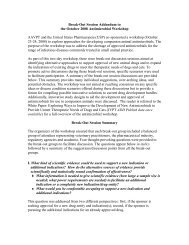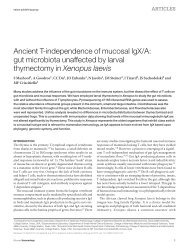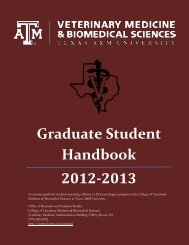Download PDF - College of Veterinary Medicine - Texas A&M ...
Download PDF - College of Veterinary Medicine - Texas A&M ...
Download PDF - College of Veterinary Medicine - Texas A&M ...
You also want an ePaper? Increase the reach of your titles
YUMPU automatically turns print PDFs into web optimized ePapers that Google loves.
Faculty/Staff Focus<br />
Davidson named diplomate <strong>of</strong> the ACVSMR<br />
Dr. Jackie Davidson, clinical<br />
pr<strong>of</strong>essor in the Department <strong>of</strong><br />
<strong>Veterinary</strong> Small Animal Clinical<br />
Sciences at <strong>Texas</strong> A&M <strong>College</strong> <strong>of</strong><br />
<strong>Veterinary</strong> <strong>Medicine</strong> & Biomedical<br />
Sciences (CVM), recently became one<br />
<strong>of</strong> the first diplomates <strong>of</strong> the American<br />
<strong>College</strong> <strong>of</strong> <strong>Veterinary</strong> Sports <strong>Medicine</strong><br />
and Rehabilitation (ACVSMR) through<br />
successful completion <strong>of</strong> a subject<br />
matter examination.<br />
The ACVSMR is the newest<br />
veterinary specialty college approved<br />
by the American <strong>Veterinary</strong> Medical<br />
Association (AVMA), having been<br />
recognized by the AVMA two years ago.<br />
According to the ACVSMR website,<br />
the mission <strong>of</strong> the college is to advance<br />
the art and science <strong>of</strong> veterinary<br />
medicine “by promoting expertise in<br />
the structural, physiological, medical,<br />
and surgical needs <strong>of</strong> athletic animals<br />
and the restoration <strong>of</strong> normal form<br />
and function after injury or illness.”<br />
Diplomates can become specialists<br />
in either canine or equine sports<br />
medicine or rehabilitation. Davidson<br />
received her certification in canine.<br />
For candidates to become diplomates<br />
<strong>of</strong> the ACVSMR, they must complete a<br />
three-year residency, be published in<br />
the field, submit five case reports, and<br />
pass a two-day examination. Since the<br />
specialty is only two years old, there are<br />
only a few veterinarians in residencies<br />
now. Davidson, however, was one <strong>of</strong> the<br />
few individuals who qualified to take<br />
the exam without doing a residency.<br />
To be exempt from the residency<br />
portion <strong>of</strong> the process, applicants were<br />
required to submit their credentials<br />
continued from page 43<br />
<strong>Texas</strong> <strong>Veterinary</strong> Medical Association<br />
Teaching Award: Dr. Glennon Mays<br />
<strong>Texas</strong> <strong>Veterinary</strong> Medical Foundation<br />
Earl Waddell Memorial Award: Dr. Medora<br />
Pashmakova<br />
VMTH Clinical Service Award: Dr.<br />
Adam Patterson<br />
Bridges Teaching and Service Award: Dr.<br />
Lynn Ru<strong>of</strong>f<br />
Bridges Teaching Award: Dr. Ashley<br />
Saunders<br />
Richard H. Davis Teaching Award: Dr.<br />
Kathy Scott<br />
<strong>Texas</strong> <strong>Veterinary</strong> Medical Association<br />
Teaching Award: Dr. Phillipa Sprake<br />
for approval. Criteria that the board<br />
considered included having at least<br />
10 years <strong>of</strong> work experience, having<br />
publications in the field, and being<br />
a faculty member actively involved<br />
in clinical and research aspects<br />
<strong>of</strong> veterinary sports medicine and<br />
rehabilitation. Once the credentials<br />
were approved, the selected applicants<br />
were allowed to go straight to the exam<br />
portion <strong>of</strong> the process. This residency<br />
exemption option will be available<br />
for only the next two years. This was<br />
the first year the certifying exam was<br />
<strong>of</strong>fered.<br />
Davidson said the exam was one <strong>of</strong><br />
the hardest she has ever taken.<br />
“I’m board-certified by the American<br />
<strong>College</strong> <strong>of</strong> <strong>Veterinary</strong> Surgeons and<br />
the difficulty level was comparable to<br />
that. You leave the exam and think,<br />
‘There is no way I passed that.’ But I<br />
did pass,” Davidson said.<br />
Davidson prepared for the exam<br />
by reading and taking continuing<br />
education courses in the field. While<br />
reading a book or article related to the<br />
topic, Davidson would take notes which<br />
she later used to study for the exam.<br />
“Then, the last six weeks before the<br />
exam, I had time <strong>of</strong>f clinicals and all<br />
I did was sit and study for 12 hours a<br />
day,” she added.<br />
Davidson said she took the exams<br />
because she felt prepared by her<br />
experiences from working in postoperative<br />
rehabilitation for 10 years<br />
and her dedication to continuing<br />
education.<br />
“I was working in this area, so I<br />
wanted to have the certification that<br />
Speaker-Elect Faculty Senate: Dr. John<br />
Stallone<br />
Pfizer Animal Health Award for Research<br />
Excellence: Dr. Jörg Steiner<br />
<strong>Texas</strong> <strong>Veterinary</strong> Medical Association<br />
Research Award: Dr. Dickson Varner<br />
Women’s Faculty Network (WFN)<br />
Outstanding Mentoring Award: Dr. Jane<br />
Welsh<br />
Second author on paper in Genome<br />
Research: Dr. James Cai<br />
Visiting Pr<strong>of</strong>essor Scholarship from the<br />
German Cancer Center Institute (DKFZ):<br />
Dr. Gloria Conover<br />
Charter Diplomate, American <strong>College</strong> <strong>of</strong><br />
<strong>Veterinary</strong> Microbiologists: Dr. Tom Craig<br />
Dr. Jackie Davidson and Amadeus<br />
represented this other special skill<br />
set and knowledge area that sets me<br />
apart,” she said.<br />
Davidson explained that her dream<br />
is to have a residency program at the<br />
CVM where residents <strong>of</strong> the program<br />
can receive training and become<br />
specialists in the field.<br />
Davidson is currently a surgeon for<br />
the Small Animal Hospital, but also<br />
oversees the physical rehabilitation<br />
service.<br />
“My job here is primarily as a<br />
surgeon, but I would like to build up<br />
the rehab portion <strong>of</strong> [the hospital].<br />
That’s kind <strong>of</strong> what I do now. Most <strong>of</strong><br />
my time is spent actually in the surgery<br />
service, but I help oversee the rehab<br />
service at the same time,” she said.<br />
Davidson is the second member<br />
<strong>of</strong> the CVM family to become a<br />
diplomate. Dr. William Moyer,<br />
pr<strong>of</strong>essor and special assistant to the<br />
dean, is a founding diplomate <strong>of</strong> the<br />
college.<br />
TAMU Environmental Health & Safety’s<br />
Safe Laboratory: Dr. Maris Esteve-Gassent<br />
Upcoming Paper in Science: Drs.<br />
Bill Murphy, Jan Janecka, and Emma<br />
Teeling<br />
Paper selected for the cover <strong>of</strong> the April<br />
2011 issue <strong>of</strong> Molecular Endocrinology:<br />
Dr. Weston Porter<br />
Newly Elected Chair, Institutional Animal<br />
Care Use Committee: Dr. John Stallone<br />
Newly Elected Chair, Committee on Academic<br />
Freedom, Responsibility, and Tenure:<br />
Dr. Mark Westhusin<br />
Contributed to the “Teaching for Tomorrow”<br />
series showcasing award-winning <strong>Texas</strong><br />
A&M faculty members: Dr. Deb Zoran<br />
CVM Today • Winter 2012 • 45



